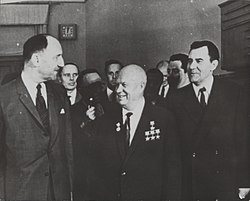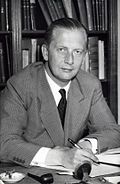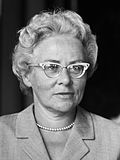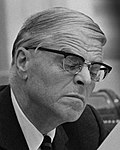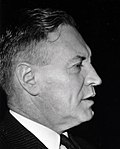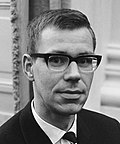Marijnen cabinet | |
|---|---|
| Cabinet of the Netherlands | |
  The installation of the Marijnen cabinet on 24 July 1963 | |
| Date formed | 24 July 1963 |
| Date dissolved | 14 April 1965 1 year, 264 days in office (Demissionary from 27 February 1965) |
| People and organisations | |
| Monarch | Queen Juliana |
| Prime Minister | Victor Marijnen |
| Deputy Prime Minister | Barend Biesheuvel |
| No. of ministers | 14 |
| Member party | Catholic People's Party (KVP) People's Party for Freedom and Democracy (VVD) Anti-Revolutionary Party (ARP) Christian Historical Union (CHU) |
| Status in legislature | Centre-right Majority government |
| History | |
| Election | 1963 election |
| Legislature terms | 1963–1967 |
| Incoming formation | 1963 formation |
| Outgoing formation | 1965 formation |
| Predecessor | De Quay cabinet |
| Successor | Cals cabinet |
| This article is part of a series on |
| Politics of the Netherlands |
|---|
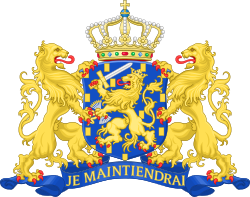 |
The Marijnen cabinet was the cabinet of the Netherlands from 24 July 1963 until 14 April 1965. The cabinet was a continuation of the previous De Quay cabinet and was formed by the Christian democratic Catholic People's Party (KVP), Anti-Revolutionary Party (ARP) and Christian Historical Union (CHU) and the conservative liberal People's Party for Freedom and Democracy (VVD) after the election of 1963. The cabinet was a centre-right coalition and had a substantial majority in the House of Representatives with prominent Catholic politician Victor Marijnen the Minister of Agriculture and Fisheries in the previous cabinet serving as Prime Minister. Protestant Leader Barend Biesheuvel served as Deputy Prime Minister, Minister of Agriculture and Fisheries and was given the portfolio of Suriname and Netherlands Antilles Affairs.
Contents
The cabinet served in the middle of the tumultuous 1960s, domestically it had to deal with the counterculture and economic changes following the discovery of the Groningen gas field and it had to deal with the fallout of the marriage between Princess Irene and Carlist Carlos Hugo of Bourbon-Parma and it was able to implement several major social reforms to health insurance and the public broadcasting system, internationally the disbandment of the Netherlands New Guinea was finalized. The cabinet suffered several major internal conflicts, and fell just 19 months into its term on 27 February 1965 following a conflict over the implantation of Commercial Broadcasting and continued in a demissionary capacity until it was replaced with the Cals cabinet. [1] [2]






